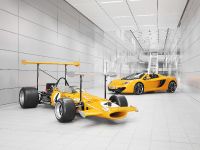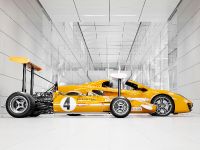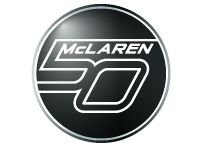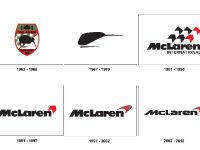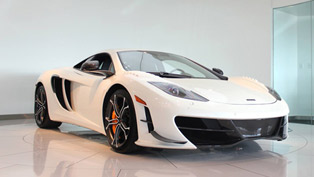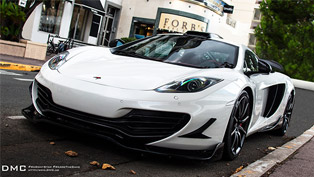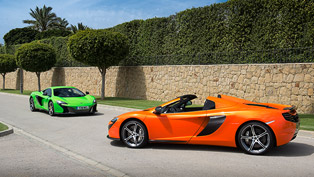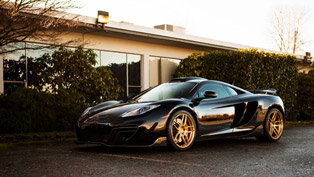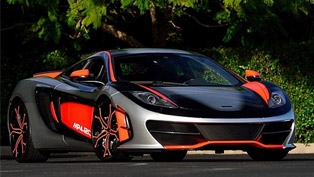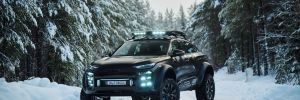1969 McLaren M7C and MP4-12C Spider
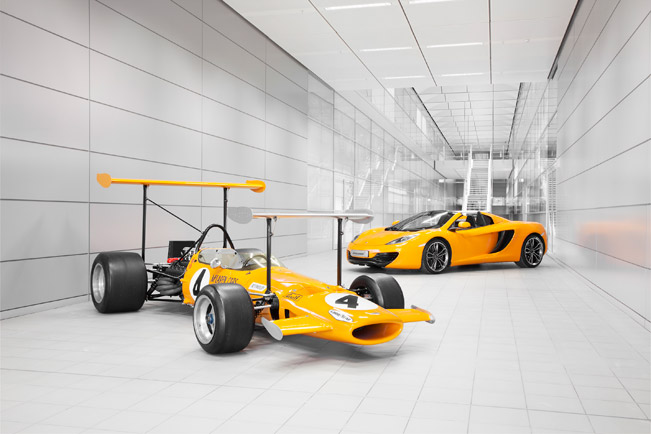
McLaren is going to celebrate their 50th anniversary on September 2nd, this year.
The original name of the company is Bruce McLaren Motor Racing Ltd and it has been launched since 1963. For the celebration, McLaren will use a 50th anniversary logo on everything from their shirts to the new MP4-28 Formula 1 that will debut on January 31st. They also intend to host a lot of unique events and celebration throughout the year.
If we were to follow Bruce's words to the letter, there'd be little time for recollection, but on the eve of our half-century there's surely time for the briefest of breaths and the opportunity to take a look behind us at the sweeping vista built up in the indelible shadow of our founder:
- Our Formula 1 team has become a global household name; since our arrival in the sport, at the 1966 Monaco Grand Prix, we have won more races (182) than any other constructor, started from pole position 155 times and scored 151 fastest laps. In 2012, we achieved the fastest-ever time for a Formula 1 pitstop (2.31s at Hockenheim), recorded our 58th consecutive points-scoring finish, an all-time record, and have now led more than 10,000 racing laps.
- The exploits of our greatest world champions will always bring F1 to life: Emerson Fittipaldi ignited the passion of his native Brazil; James Hunt created as many headlines on the front pages as on the back; Niki Lauda and Alain Prost turned sport to science; the burning intensity of Ayrton Senna will live on for ever, while Mika Hakkinen and Lewis Hamilton will always be remembered for their raw speed and fearless aggression.
- Our legacy in North American sportscar racing is writ equally large: in the heyday of the mighty CanAm series, we steamrollered the opposition, lifting five successive championship trophies (1967-1971) and winning an incredible 43 races in our iconic, thundering V8-engined sportscars.
- We went to the Indy 500 for the first time in 1970, returning with greater strength until we won the USA's most famous motor race in 1974 with Johnny Rutherford. We repeated the feat with Rutherford in 1976, too.
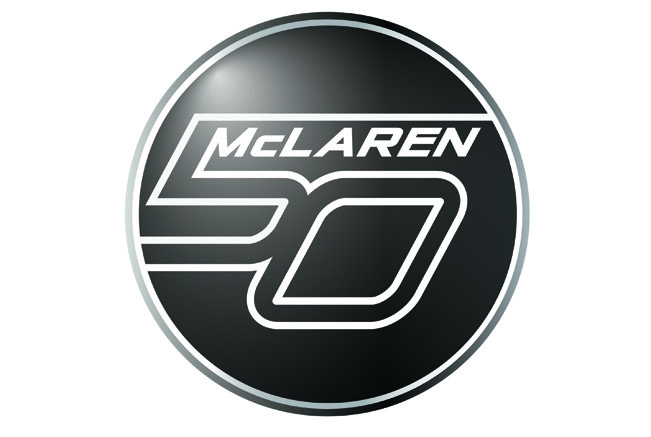
- Today, every single car in Formula 1, the Indycar Series and NASCAR relies upon McLaren Electronics' standardised ECUs to control their engines and feed data back to the garage.
- Introduced back in 1993, the McLaren F1 road car has lost none of its unique appeal and is still considered by many to be automotive world's definitive supercar. To this day, it remains the fastest naturally aspirated production car in the world. In GTR racing guise, it won the 24 Hours of Le Mans, also scooping third, fourth and fifth places on its debut in 1995.
- The next roadcar project was with German manufacturer Mercedes-Benz, and saw the successful build of the Mercedes-Benz SLR McLaren, which became the best-selling carbon-based car ever.
- Since its launch in 2010, McLaren Automotive has developed into a world-class road car manufacturer, successfully developing and building the 12C and the 12C Spider high performance sports cars. Both models exploit our unparalleled understanding of carbon fibre and electronic driver systems to create a groundbreaking product of unequalled weight, strength, performance and driveability.
- In a return to our sportscar roots, the debut of the 12C GT3 was an unqualified success, scoring 19 victories on its competitive debut in 2012. In September, as Vodafone McLaren Mercedes crossed the flag to win in Monza, McLaren's GT cars also took top spot at races in British, French and Spanish championships – an incredible achievement.
- Fittingly, this year, McLaren Automotive stands poised to open its 50th global dealership ahead of the worldwide launch of the P1™ – our newest model and a machine that's set to rewrite the definition of the modern supercar.
- Away from the track, McLaren leads the world in the application of Formula 1 technology and expertise to other industries. McLaren Applied Technologies helped British cyclists, rowers, sailors and canoeists win 15 gold medals last summer. We worked alongside Specialized to design Mark Cavendish's world championship-winning S-Works Venge bicycle. Working with Birmingham Children's hospital, we have improved the monitoring of sick children in intensive care. McLaren has also designed systems to help the Bay Area Rapid Transit railway in San Francisco to run more efficiently and to reduce the CO2 emissions from plane movements at airports.
Source: McLaren
